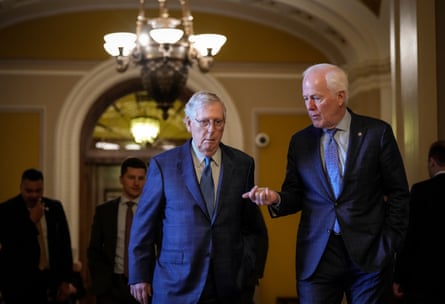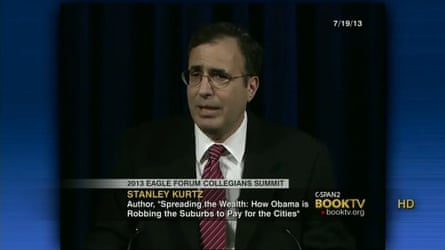When two US senators – a Texas Republican and a Delaware Democrat – introduced a bill in June 2022 to expand grants for civics education, most observers saw it as something of an olive branch between the parties.
But despite initial momentum, three now-familiar letters stopped the bill in its tracks: CRT.
A mostly unknown conservative scholar writing in the National Review claimed the bill would “allow the Biden administration to push Critical Race Theory (CRT) on every public school in the country”, calling the Republican co-sponsors “naive” victims of a hidden leftist agenda.
Critical race theory, which posits that racism permeates American institutions, has become rightwing shorthand for any classroom discussion of race.
Senator John Cornyn, who proposed the legislation and is the former GOP majority whip, dismissed the allegations, writing on Twitter that “the false, hysterical claims are untrue and worthy of a Russian active measures campaign, not a serious discussion of our bill”.
But truthful or not, the criticisms spread like wildfire.
The National Review op-ed racked up thousands of interactions on social media, far-right Breitbart News ran an article whose headline pulled word-for-word from the editorial and Florida governor Ron DeSantis released a press release warning the $1bn federal civics bill would “award grants to indoctrinate students with ideologies like critical race theory.” High-profile commentators urged their followers to call lawmakers opposing what they described as “Trojan horse garbage” sponsored by “Rinos”, or Republicans in name only.
The senators’ “Civics Secures Democracy Act” went no further.
But how did this firestorm start?
The story begins years prior and revolves around Stanley Kurtz, the author of the op-ed that lit the match and a little-noticed power player shaping the right’s recent offensives in the education culture wars.

A campaign against ‘woke civics’
Though his writings are regularly shared by GOP heavy hitters including Fox News analysts, groups like Parents Defending Education and sitting US senators, Kurtz has flown mostly under the radar.
A 69-year-old former university instructor and longtime conservative commentator, Kurtz has spearheaded a quiet but influential campaign to cleanse classrooms of what he calls “woke civics” – a term that extends to any hands-on civics lessons entailing student contact with elected officials.
He declined a phone interview, saying he “prefer[s] to comment by email”. In written messages, the scholar explained he believes hands-on civics projects “tilt overwhelmingly to the left”.
“Any sort of political protest or lobbying done by students is subject to undue pressure from the biases of teachers, peers and non-profits working with schools. Political protest and lobbying ought to be done by students outside of school hours, independently of any class projects or grades,” said Kurtz.
Neal McCluskey, director of the libertarian Cato Institute’s Center for Educational Freedom, has documented over 3,400 ideological “battles” in public schooling – over issues like controversial books or sex education – for more than a decade and said he has yet to see “compelling evidence” that liberal bias in civics classes has become a widespread problem. A 74 review of McCluskey’s tracker revealed that only a handful of incidents concerned civics.
The argument amounts to a fabricated “boogeyman”, University of South Carolina law professor Derek Black said.
The idea that leftist teachers could “create little warrior bands of students to go out and fight their political wars for them has become a captivating concern for some on the right”, Black said.
A national network
In 2021, Kurtz penned model legislation stipulating that students should be banned from receiving class credit for “lobbying” or “advocacy” at the local, state or federal level.
At least eight bills proposed in five states pulled from the document, according to a Pen America report. The conservative Manhattan Institute included the legislation’s anti-lobbying provisions in its own model bill presented at the American Legislative Exchange Council, an annual forum to swap rightwing law-making proposals.
Linda Bennett, a recently retired GOP South Carolina state representative, introduced a 2021 bill by the exact same name as Kurtz’s “Partisanship Out of Civics Act”.
“No need to reinvent the wheel if somebody’s got it right,” she told The 74.
Bennett insisted that her office had become flooded with young students, coerced by their educators, demanding that she “please support allowing teachers to teach critical race theory”. But she could not name a specific school or teacher that had influenced students to take an activist stance.
In Texas, a provision from Kurtz’s model bill found its way into the state’s 2021 anti-CRT law and resulted in an unprecedented restriction on students’ civic engagement. The legislation banned assignments involving “direct communication” between students and their federal, state or local lawmakers.
In the two years since passage, Texas educators say they have been forced to abandon time-honored assignments such as having students attend a school board meeting or advocate for local causes like a stop sign at an intersection near campus.
Sarai Paez, a recent high school graduate from a suburb outside Austin, said the new law is “a step backwards”. Students in her ninth-grade civics class passed a 2018 city ordinance calling for youth representation in their local government – advocacy that would now be outlawed.
“There’s no need to take away something that has affected … a group of people in a positive way,” she said.
Kurtz and the rightwing lawmakers and advocates who have helped translate his policy agenda into practice are linked by more than just shared philosophy. They’re also connected by money.

His employer, the Ethics and Public Policy Center, a conservative thinktank “dedicated to applying the Judeo-Christian moral tradition to critical issues of public policy”, has a dozen funders in common with the Manhattan Institute, tax filings reveal, including mega-donors like the Charles Koch Foundation.
Texas state representative Steve Toth, co-sponsor of the 2021 legislation restricting civics assignments, also receives campaign funds from the Koch Foundation.
Neither Toth nor the Ethics and Public Policy Center responded to requests for comment.
Governor DeSantis, in Florida, also shares at least one donor, Fidelity Investments, in common with Kurtz’s think tank.
The issues of interest to Kurtz have repeatedly found their way to DeSantis’s bully pulpit. The governor recently doubled down on civics education rooted in “patriotism” and his rejection earlier this year of the College Board’s AP African American Studies curriculum came just a few months after Kurtz began writing critically about the issue. Kurtz named two authors specifically in his September article, Robin Kelley and Kimberlé Crenshaw, who the Florida department of education later objected to.
Education department press secretary Cassie Palelis said Florida’s concerns with the course were the “result of a thorough review” and its correspondence with the College Board had begun in early 2022. When asked whether officials referenced Kurtz’s work during that process and, if so, what role it played, Palelis did not address the question.
As for the Kurtz model legislation, its influence continues to spread.
In January, a district outside of Colorado Springs voted to adopt a new social studies curriculum that bans awarding course credit for service learning or action civics.
“We are in it for the long haul,” said David Randall, research director at the National Association of Scholars, which published Kurtz’s model bill. “Our mission is to inspire as many Americans as possible to join this work.
Stay connected with us on social media platform for instant update click here to join our Twitter, & Facebook
We are now on Telegram. Click here to join our channel (@TechiUpdate) and stay updated with the latest Technology headlines.
For all the latest Education News Click Here
For the latest news and updates, follow us on Google News.
